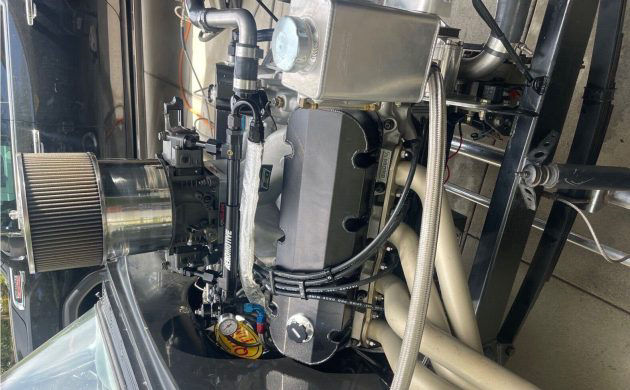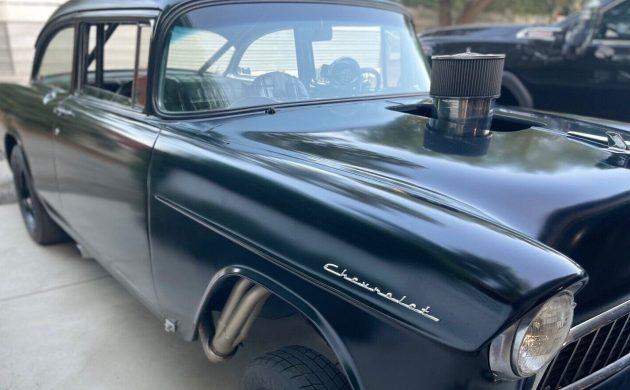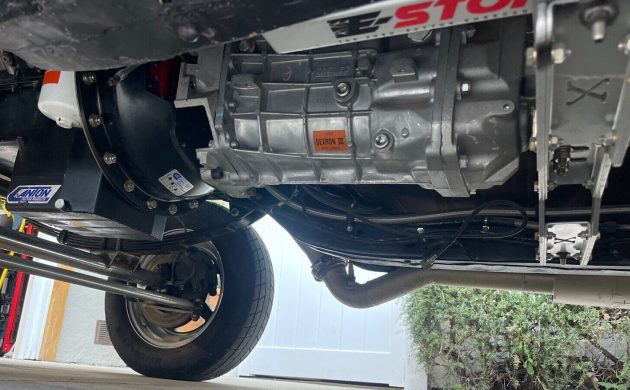924 Horsepower Gasser: 1955 Chevrolet 150

When it comes to road movies I could watch over and over in my youth, Two-Lane Blacktop may not have been an all-time favorite but it certainly gets an honorable mention. However, its impact wasn’t so much for the acting ability of James Taylor’s role as “The Driver”, but more geared to the gasser he’s behind the wheel of, a 1955 Chevrolet not unlike the creation for sale here on eBay. This one’s got plenty of the right stuff and seems track-ready, but the seller just hasn’t had the time and is now ready for somebody else to enjoy it. The Chevy is in Trabuco Canyon, California, with the owner hoping for $48,000, but that may not be firm, as there’s also the opportunity to submit an offer if a potential buyer finds that a bit excessive.

Regarding the already mentioned film, three ’55s were built, two equipped with 454 engines and the third with a 427, but the visionary here opted for a 565 big block crate motor instead. The laundry list of components inside is impressive, and with 14:1 compression you’re going to need 112 octane gas. No problem there, as the seller purchased a 55-gallon drum with what’s left included in the sale, along with the Chevy’s Aeromotive fuel tank also full upon delivery. Not that there’s anything unimpressive under the hood, but one of my favorite features is the trajectory of the headers, which are visible from the outside behind the front wheels where the fenderwells once resided.

Understandably, the seller’s main focus is describing the drivetrain, and he says very little about the exterior. However, the panels look surprisingly straight, at least the ones we get a clear shot of. The condition of the black finish along with the tight body gaps make me speculate this one hasn’t seen very much quarter-mile travel yet, with the owner indicating he’s only driven it to work a couple of times so far.

When you’ve got 924 horsepower and 767 pounds of torque in the bay, it’s important to properly prepare the underside to transfer all that brawn to the pavement. Fortunately, things down below appear more than capable for the task, plus we get a good shot of the Tremec 6-speed manual transmission. Further back, there’s a Moser 9-inch rear-end, with a custom driveshaft in between. Four-wheel disc brakes are also in place, should those Weld wheels need to be slowed down in a hurry.

Things inside follow suit with the racing atmosphere, including custom seats, a rear roll bar, and an aftermarket steering wheel. In contrast, I think that’s still a factory ’55 speedometer in the dash, and there’s even a dome light still present, in case the need arises to rummage around the glove box at night for the pink slip. If this racer was showing lots of use and abuse, I might take issue with the $48k price tag, but it appears like a fairly new build and just the 565 crate engine probably cost about a third of that amount. What are your thoughts on this one?
Auctions Ending Soon
 2006 Ford Mustang Saleen S281 SCBid Now1 days$15,000
2006 Ford Mustang Saleen S281 SCBid Now1 days$15,000
 2002 Subaru Impreza WRXBid Now4 days$100
2002 Subaru Impreza WRXBid Now4 days$100
 1975 Chevrolet Corvette ConvertibleBid Now4 days$3,000
1975 Chevrolet Corvette ConvertibleBid Now4 days$3,000
 1964 Ford F-100 Camper CustomBid Now4 days$500
1964 Ford F-100 Camper CustomBid Now4 days$500
 2006 Jeep Wrangler SportBid Now6 days$4,000
2006 Jeep Wrangler SportBid Now6 days$4,000

Comments
I miss my first HS car…. 1955 Belair Hardtop 327 340 HP with 3/4 cam and headers tied to a inline four speed.
Back in the day in 1979 it sold for $800 dollars with a nice black paint job….
but then i could also miss my second car…. 1969 Z28 Rally Sport Hidden Headlight…. and rubber type Neoprhame bumper….
This car looks fun…
good luck with the sale….
What happened to the rest of the cam ?
3/4 cam was a very common term back in the day. Back in the early 70’s my 62 SS 327 Impala had a 70 350 short block replacement, I put a Duntov 30/30 Corvette cam in it, Wow, really woke it up. Later put the cam in a 283 56 2 dr. Both had 4 speed M22 Rock Crushers. 56 is gone, still have a SS & a 55 2 dr ht Belair along with others. 55 in Ad looks like it means business.
Let me late fifty year old splain a 3\4 cam 😎
If this tri-five could talk it probably knows 😎
I grew up with and around muscle car families.
TECH QUICKIE: What is a ‘3/4 Race’ Camshaft?
Occasionally the term “¾ race cam” pops up in conversation, usually with veteran hot rodders or nostalgia groups. Sometimes you’ll see it in print ads and online product listings. From a purely technical viewpoint it means little in the way of explaining a camshaft’s performance potential. It’s just one of those glorious reminders of the early days when camshaft grinders had furious rivalries on the track and in the media. It’s also a significant milestone in a developing enterprise that snowballed into what we now recognize as the street-performance market.
The original 3/4 race cams are the forerunners of today’s street-performance grinds.
The term likely originated in the ‘50s as the burgeoning hot-rod industry was modifying Ford Flatheads to drag race on airport runways and attempt top-speed runs on dry lake beds. The legendary Ed Winfield was one the early pioneers in grinding camshafts with more aggressive lobe profiles, and the cams were often labeled as full race for promotional purposes.
“And then some guys wanted a milder cam that could also be used on the street, so they called it a three-quarter race cam because it didn’t have as much duration and lift,” explains John MacKichan of the Speedway Motors Museum of American Speed in Lincoln, Nebraska.
You have to remember that tooling up the master lobe that was necessary to regrind an existing camshaft core was quite involved. For performance engine builders in the ‘50s and ‘60s, there were only a handful of camshafts for even the most popular engines. In fact, some cam grinds were blessed with their own nicknames that are still revered as iconic hot rod hardware today, such as the Duntov cam (3736097) for small-block Chevys and the Le Mans cam (C7FE-6250-A) for Ford small-blocks.
When the great cam wars started in the ‘60s, the term “¾ race” was so recognizable as a performance model somewhere between full race and mild stock performance that it seemed like the perfect fit for any hot rodder. As the market expanded in both applications and more grinds for each of those engines, the term slowly lost much of its meaning. Now you can order grinds specific for nitrous, boost, low-end torque or even just a lumpy idle.
“The modern equivalent would be the Stage 1, Stage 2 and Stage 3 type cams that were popular in the Import/Sport Compact world of the late ‘90s,” explains Billy Godbold of Comp Cams. “It really doesn’t mean anything.”
In fact, Godbold says one of the major players in those legendary cam wars despised the designation.
“Harvey Crane hated the three-quarter term,” says Godbold, who was very close to Crane before he passed away in 2013. “I think the term three-quarter was around even before the real cam wars begun.
If you go back before the mid ‘60s, all the aftermarket cams were just bigger versions of the OEM profiles with more lift and duration,” continues Godbold. “What set Harvey apart from that generation was that Harvey redesigned everything from below the lash point up to max lift. The other guys probably did not have the math background, and no one had the required design software.
“Hence, the old ¾ race camshaft was just an in-between duration and lift version of the street Flathead and race Flathead,” sums up Godbold, adding that “by the time Comp was born, the 3/4 deal was dead as a hammer.”
Have a great day !
See my post about engine size deleted ,and correction made in write up,I should have got a Thank you instead of deleted.
Apologies Rw, yes, the correct CI was indeed 454, and we thank you for the clarification.
Maybe you can answer a question,I always wandered what the specs. are on a 3/4 cam
Me too mine is a479 lift don’t know what a 3/4 is
When I worked at a perfyoruenred auto parts store one of the older guys with 30 years under his belt said whenever someone asked for a 3/4 race cam he’d pick whatever was 3/4’s if the way down the page.
Steve R
When I sold parts, guys were always coming in looking for a monster cam. After talking to them to determine what other parts were in the engine and what they wanted the car to do, I’d sell them the cam that would work the best and have a little bump (which is what they really wanted). I was dealing with street cars. It was almost always a little (at least) milder than they were asking for. They always loved it and I never told them.
Another term that was asked for was an “RVcam”.
That’s a really good question. My understanding is that depending on an engine’s specs, a full race cam provides as much lift and duration as that particular motor can handle. A 3/4 cam would be 25% milder, and often more preferable if the car was also going to see some street use. I’d like to hear what other readers have to say regarding Rw’s question.
Mike, if you look at a cam catalog you will find many different race cams. There are differences between the type of racing even track configurations such as oval track, which will often list different sized for 1/4, 3/8 or 1/2 mile, then dirt or asphalt or engine size. Then drag racing which will vary depending on class, weight, engine size, automatic or stick shift, stall speed of the torque converter, etc., don’t forget road racing, boat racing, off-road racing, they all have different requirements.
The term might have meant something 50 or 60 years ago, not today.
Steve R
Also my first car. A ’55 Chevy 210 2 door sedan. Went from 265 to 327 to a built 396. Soon after, during a late night launch, it sheared off the driveshaft at the front U-joint and REALLY launched.
Drive shaft loop over front u-joint ….
Me too mine is a479 lift don’t know what a 3/4 is
Not to worry, Awade… You just ain’t go enuf hair…. Gray that is….. Wait’ll the other geezers like the guy I shave with start talkin’ about FULL Race…. Woo Hoo….. This is the nicest looking realistic streetable replication of a “B/Gasser” I ever did see…. If I just could find enough Benjamins…..
How can you not love two lane blacktop.that dude must be high.
This is not a “race” car, far from it. It’s unsafe and would never pass tech, it would only be allowed to run at a track whose sole interest was getting the money from the purchase of the tech card.
There is no metal partition in the trunk separating the fuel cell and exposed battery from the cars interior. The roll bar has a removable bar behind the seats and no door bars. The plastic seats have 4 nutserts pressed into the bottom which are then used to to bolt the seat to the seat track, most importantly, the seat back isn’t bolted to the roll bar, which is required in the rule book. I’m sure there are other reasons it wouldn’t pass, but it doesn’t really matter. I work tech at the local track several races every year and would never sign my name to its tech card. The problems with the car, especially with the seat could easily kill a driver or passenger on the street.
This car was put together by someone that had no knowledge of or concern about basic safety equipment, it shows with the rest of the cars build, which looks like it was pieced together based on that the found at local swapmeets or on Craigslist or Facebook market place.
Steve R
Couldn’t agree more Steve R. Our SCCA cage requirements are almost completely in line with NHRA. Big thing is driver protection and safety for rescue crews, thus things like isolating the fuel cells. Also notice in the picture the seat with head restraints. I’d be dead as of November of 2016 if I hadn’t had the side head restraints as I hit oil and slid into a concrete jersey barrier at over 70mph sideways. Only damage to me was two bruises caused by the HANS head and neck device and my left over the shoulder strap. Rescue lady was amazed at my 160 over 80 blood pressure. I told her that I was thrilled to have any blood pressure! Car was a total but all the safety gear worked. Car shown is the replacement.
Ouch.
Steve R.: SPOT ON. … no NHRA tech line for you!
Two Lane Blacktop was a tour de force for legendary actor Warren Oats. (GTO)
“Damned hippies been following me clear cross two states”. (Looks out window) “Three states!”
Well,,,,I think the movie is fresh enough, these cars have an instant attraction to anyone that saw the movie. It was a motorheads “must see”, much like the sci-fi crowd with Star Wars. Seem however, every double nickel Chevy gasser has that on its shoulder. As the movie gets less and less popular, nobody will care about 2 Lane Blacktop, sorry. I saw an interview with Jay Leno and James Taylor. Leno had recreated the car from the movie, as a tribute of sorts, to that iconic movie. Well, Taylor was less than excited, fact is, he told Leno he hated making the movie and to Lenos surprise, never did see the final cut. Don’t get me wrong, I’m still a motorhead, and this is best there was and why the movie was such a hit to so many. I’m not sure that will be the case in the future.
I despise the term ‘tri-five’, it’s either a 55 chevy (my favorite) or a 56 or a 57. They are individual cars each with their own followers! In my 55 I have a bored out 283 making it a 301, with a Corvette ‘fuel injection’ solid lifter cam. Darn thing revved so high it blew up the clutch.
If I had that I’d cruise around in it and try to find Falfa to race. He was fast but I think this one might beat him.
Funny enough the two lane car and Falfa car is the same car!
The car also showed up in the background of the Adam-12 episode “Who won”?
The safety issues seem fixable.
The build is clean and has a constellation of good parts.
Kudos to the safety tech’s reading of the issues. The fallibility off the seats is blatant.
All fixable/nice bones here…
Oh boy. Can I keep this short? My intro to Two Lane Blacktop was the cover of Esquire magazine, where they showed a promo picture and declared that it would be the movie of the year…..and inside the issue was then entire screenplay. I read it, then waited for the movie to come out. I enjoyed it, but critical response was low. Oh well, it was a nugget for just us car guys, right? Couple of things: Warren Oates: masterful as a kinda pathetic guy with a GTO. Beach Boys drummer Dennis Wilson as the Mechanic. The Girl, Laurie Bird, killed herself in Art Garfunkel’s apartment at 25. Terrible. That year I was in a private school, Bullis, in Potomac Maryland. The parking lot had a green 55 Chevy like this one….big engine, tilt glass front end, huge tires, beam axle in front…..an 1/8th mile car owned by a guy named Chaz Puglisi. Parking lot also had Porsches, an Elva Courier (!) and a brand new Mk IV Spitfire, which, to my eye, was perfect. Of course, I had no car at all! The 65 Corvair, various Sunbeam Alpines, Cortina, GT6, and a stable of early, fringe BMWs (1600, 2000CS) were in my near future.
funny how everyone gets lost on movies, cams, what they used to have etc. and have so little to say about this totally bad and well done new-old school machine. Brings back memories of nasty street rods but with new generation nastiness’ Don’t get lost, appreciate it for what it is..